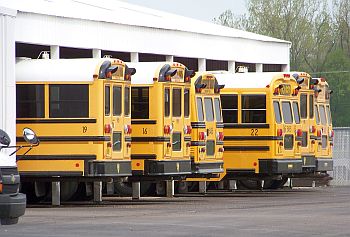June 23, 2012
 06/25/12 Further discussions on the way bus maintenance for the Plymouth School Corporation will be handled in the future will likely not take place until the August meeting of the School Board. Over the last several meetings of the School Board, members were given information and an opportunity to ask questions concerning the possibility of outsourcing the maintenance of the school’s 40-plus fleet.
06/25/12 Further discussions on the way bus maintenance for the Plymouth School Corporation will be handled in the future will likely not take place until the August meeting of the School Board. Over the last several meetings of the School Board, members were given information and an opportunity to ask questions concerning the possibility of outsourcing the maintenance of the school’s 40-plus fleet.
Until the last meeting on June 5, Wiers of Plymouth was the only company that had submitted a proposal on the matter. During that meeting, a second proposal was discussed from Oliver Ford Lincoln, Plymouth.
Currently bus maintenance is done my school personal in the school’s maintenance department area. According to Superintendent Dan Tyree, the space is now needed for classroom space to expand the vocational offerings for high school students. Also according to Tyree, a local industry is offering to partner with the schools to provide both training and equipment on specialized machinery, such as CNC machines.
The matter was tabled until the July meeting after board members heard comments from the audience concerning possible fuel tanks that were at one time located underground in the maintenance bays. Some board members asked that soils testing, as well as any other necessary testing for safety, are taken before moving forward with a decision.
After the meeting, Superintendent Tyree learned that the two-tanks in question were actually removed in 1991 and soil testing performed at that time concluded that there was no contamination. According to Tyree, the only tank still in place is a hydraulic tank used to operate the lift for the buses. Tyree said they are having the tank removed and the soil tested, but that he doesn’t think the removal could be completed by the July meeting.
Former Assistant Superintendent Rodger Smith said after comparing the two proposals, his recommendation was to accept the Wiers proposal.
Wiers would agree to enter into a ten-year contract with an initial five year-contract that would automatically renew for successive terms. Included in the contract would be a provision that would allow either the school corporation or Wiers to terminate the contract with at least a ninety-day notice. Services provided would include, but not necessarily be limited to, planned maintenance, repairs, and tires. Additionally, they would create Department of Transportation mandated files, develop a planned maintenance system to comply with federal regulations, perform annual maintenance budgeting, complete annual bus inspections and utilize appointed technicians.
Much of the ongoing discussions and concerns by bus drivers have been over parking areas for vehicles at the Jim Neu Drive location of Wiers and how drivers could access the lot after regular business hours.
Payments for the services would be on a fixed charge per vehicle per month for the planned maintenance.
Fueling for the vehicles would remain the responsibly of the school corporation.
Oliver Ford Lincoln indicated that their proposal would cover the four main subject areas of parts, labor, storage and logistical solutions. According to John Oliver III, who submitted the proposal, they were submitting a framework and that there would need to be much open discussion on all of the details that would need to be rationalized. Included in the Oliver proposal was a commitment to carry a proper amount of parts inventory. Labor rates would be considered in the three categories of maintenance, repair and warranty. They indicated that their digital technology would allow them to access service records at any time.
Oliver Ford also proposed erecting and fully maintaining a new bus storage lot and garage facility for the care and storage of the Plymouth Schools fleet and install a fence that includes an automatic opening system that would be run by a card system; thus, allowing 24-hour access to both the service and parking facility. They would then enter into a lease agreement for the building.
Records show that the school corporation spent $179,409 on labor, parts, tires and oil in 2011 up from $147,052 in 2009 (oil costs were estimated) and $158,464 in 2010.
The State of Indiana increased the number of years that buses could be replaced on a rotating schedule from ten years to twelve years.
Carol Anders Correspondent